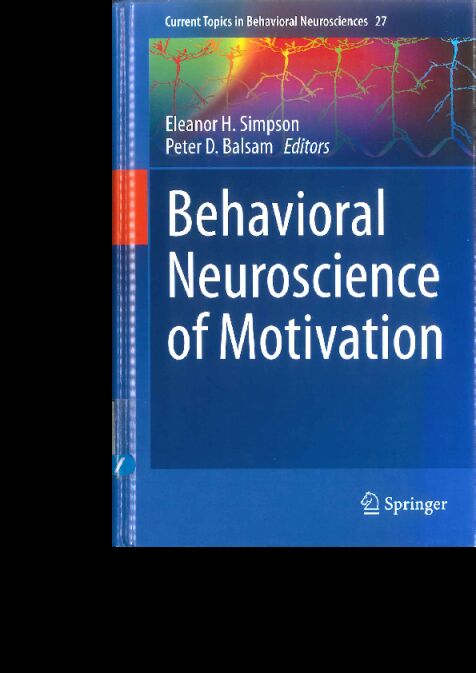书名:Behavioral neuroscience of motivation
责任者:Eleanor H. Simpson | Peter D. Balsam
前言
Motivation, defined as the energizing of behavior in pursuit of a goal, is a fundamental element of our interaction with the world and with each other. All animals share motivation to obtain their basic needs, including food, water, sex and social interaction. Meeting these needs is a requirement for survival, but in all cases the goals must be met in appropriate quantities and at appropriate times. Therefore motivational drive must be modulated as a function of both internal states as well as external environmental conditions. The regulation of motivated behaviors is achieved by the coordinated action of molecules (peptides, hormones, neurotrans-mitters etc), acting within specific circuits that integrate multiple signals in order for complex decisions to be made.
In the past few decades, there has been a great deal of research on the biology and psychology of motivation which is reviewed in this volume. Much of the work reviewed involves the investigation of specific aspects of motived behavior using multiple levels of analyses. In this way, the underpinning neurobiological mechanisms that support relevant psychological processes can be identified. In this volume, the first part considers the neurobiology of components of healthy motivational drive, and includes chapters that are focused on specific motivational goals e.g. food, sex, social interaction, escape. The second part is concerned with neural measures and correlates of motivation in humans and other animals. The next three parts of the book deal with disorders in which abnormal motivation plays a major role. Much space is devoted to this aspect of motivation because deficits in motivation occur in a number of psychiatric disorders, affecting a large population, and severe disturbance of motivation can be devastating. Deficits in motivation fall into two distinct categories: Apathy and pathological deficits in motivation which are commonly seen in patients with schizophrenia and affective disorders. The other category involves problematic excesses in behavior including addictions, the pathological misdirection of motivation. Each of these categories is addressed in separate parts, which are followed by a part on the development of treatments for disorders of motivation. The first chapter in this volume provides a more detailed roadmap of the content and also discussion of the themes that cut across chapters and parts of the book. It is hoped that the collection of reviews in the volume will expose scientists to a breadth of ideas from several different sub-disciplines, thereby inspiring new directions of research that may increase our understanding of motivational regulation and bring us closer to effective treatments for disorders of motivation.
查看更多
目录
The Behavioral Neuroseience of Motivation: An Overview of Concepts,Measures, and Translational Applications 1
Part I The Neurobiology of Components of Motivational Drive
Regulation of the Motivation to Eat 15
Sexual Motivation in the Female and Its Opposition by Stress 35
Oxytocin, Vasopressin,and the Motivational Forces that Drive Social Behaviors 51
Roles of "Wanting" and "Liking" in Motivating Behavior: Gambling, Food,and Drug Addictions 105
Orcadian Insights into Motivated Behavior 137
The Neural Foundations of Reaction and Action in Aversive Motivation 171
Part II Neural Measures and Correlates of Motivation Signals and Computations
Neurophysiology of Reward-Guided Behavior: Correlates Related to Predictions, Value, Motivation, Errors, Attention, and Action 199
Mesolimbic Dopamine and the Regulation of Motivated Behavior 231
Learning and Motivational Processes Contributing to Pavlovian-Instrumental Transfer and Their Neural Bases: Dopamine and Beyond 259
Multiple Systems for the Motivational Control of Behavior and Associated Neural Substrates in Humans 291
The Computational Complexity of Valuation and Motivational Forces in Decision-Making Processes 313
Part III Apathy and Pathological Deficits in Motivation
The Neurobiology of Motivational Deficits in Depression-An Update on Candidate Pathomechanisms 337
Motivational Deficits and Negative Symptoms in Schizophrenia: Concepts and Assessments 357
Motivational Deficits in Schizophrenia and the Representation of Expected Value 375
Mechanisms Underlying Motivational Deficits in Psychopathology: Similarities and Differences in Depression and Schizophrenia 411
Methods for Dissecting Motivation and Related Psychological Processes in Rodents 451
Part IV Addiction and the Pathological Misdirection of Motivated Behaviour
Motivational Processes Underlying Substance Abuse Disorder 473
Skewed by Cues? The Motivational Role of Audiovisual Stimuli in Modelling Substance Use and Gambling Disorders 507
Part V Developments in Treatments for Motivation Pathologies
The Role of Motivation in Cognitive Remediation for People with Schizophrenia 533
Distress from Motivational Dis-integration: When Fundamental Motives Are Too Weak or Too Strong 547
Motivation and Contingency Management Treatments for Substance Use Disorders 569
Index 583
查看PDF
查看更多
馆藏单位
中国医科院医学信息研究所



